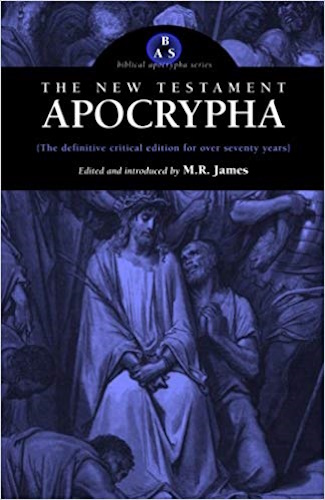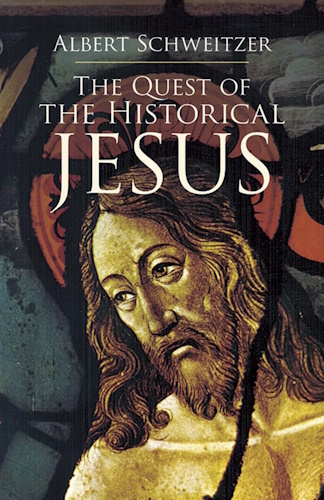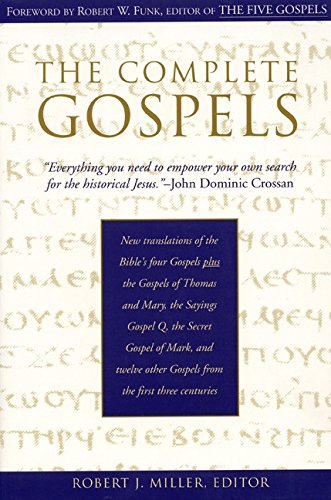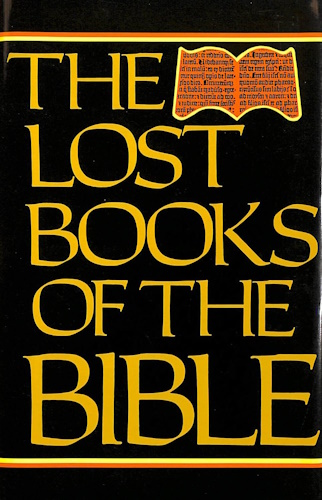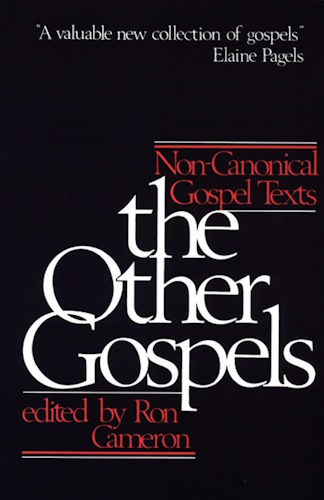
The Martyrdom of Matthew
1 The holy Matthew remained alone on the Mount praying, in the apostolic robe, barefoot, and Jesus appeared to him in the form of one of the children that were singing in Paradise.
2 A dialogue.
3 Matthew said: That I saw thee in paradise singing with the other children that were slain at Bethlehem I know; but how thou camest hither so quickly, I marvel. But tell me, where is that ungodly Herod?' He dwelleth in hell, and there is prepared for him fire unquenchable, unending gehenna, boiling mire, the worm that sleepeth not, because he killed 3,000 children.
4 Now take my Staff and go to Myrna the city of the man-eaters, and plant it at the gate of the church which you and Andrew founded. It will become a tree, and a spring will rise at its foot, and the man-eaters will eat of the tree and wash in the spring and their bodies will be changed and they will be ashamed of their nakedness, and use fire to cook their food, and learn to know me.'
5 At the city gate he was met by Phulbana the king's wife, Phulbanos his son and Erba his wife, all possessed by devils -and the devils cried out and threatened Matthew that they would rouse the king against him. He cast them out.
6 The bishop Plato heard and came out to meet him with the clergy. And Matthew preached to the people,
7 and planted the staff. And the people became humanized-
8 He baptized the queen and the rest.
9 At dawn the staff was become a tree.
10 Phulbanus the king was pleased with all this at first, but when they refused to quit Matthew he resolved to burn him.
11 Matthew had a consoling vision, and warned the people of his death.
12 The devil whom he had cast out disguised himself as a soldier and went to the king and advised him to seize Matthew.
13 He sent four soldiers, who could only hear two men talking (Matthew and Plato), and then ten who were routed by seeing a child with a torch.
14 The devil described to the king the difficulty of seizing Matthew and all that he could do. The king said: Take him yourself. l cannot, for he has destroyed all our race.
15 Who, then, are you? said the king. I am the demon Asmodaeus who was in your wife. The king adjured him to depart without harming any one, and he vanished as smoke.
16 That day the king remained quiet, but next day took two soldiers and went to the church and sent for Matthew.
17 He came out with Plato, but the king could not see him. Matthew opened his eyes.
18 The king treacherously led him to the palace. They pinned him hand and foot to the earth and covered him with papyrus soaked in dolphin oil, and poured brimstone, asphalt, and pitch on him, and heaped up tow and wood.
19 And the fire turned to dew, and all the people praised God.
20 Much charcoal from the royal baths was brought, and the twelve gods of gold and silver were set round the fire.
21 Matthew looking up to heaven, cried: Adonai Eloi Sabaoth marmari marmounth. The fire blazed up, and the king said: Where is now your magic? But all the fire blew out about the idols and melted them -whose weight was 1,000 talents of gold. And the king lamented that gods of stone and clay were superior.
22 The fire burnt up many soldiers, and then took the form of a dragon and chased the king to the palace, and curled round so that he could not go in and made him come back to Matthew, crying for help. Matthew rebuked the fire and prayed, and gave up the ghost.
23 The king had him borne in state to the palace. The body and robes were intact, and sometimes he was seen on the bier, sometimes following or preceding it, and laying his hand on Plato's head. And many sick were healed.
24 When they reached the palace Matthew was seen to rise from the bier and ascend to heaven, led by a beautiful child, and twelve men in crowns, and we saw the child crown him. The king had a coffin made of iron and sealed it with lead, and privately put it on a ship at midnight and sank it in the sea.
25 All night the brethren watched at the palace gate, and at dawn a voice came: Plato, take the gospel and the psalter and go to the east of the palace and sing Alleluia, and read the gospel, and offer of the bread and the vine, pressing three clusters into the cup, and communicate with me, as the Lord Jesus showed us the offering that is above, on the third day after he rose. So it was done, and the chanter went up on a great stone and sang: Precious in the sight of the Lord . . . . I slept and rose up again . . . And they answered: Shall not the sleeper awake? . . . Now will I arise, saith the Lord. Alleluia. They read the gospel and made the offering.
26 It was about the sixth hour, and Plato looked out to sea seven stadia away, and lo, Matthew standing on the sea between two men in bright apparel, and the beautiful child before them. And they said Amen, Alleluia. And the sea was to look upon like a crystal stone, and before the Child a cross came up out of the deep, and at the lower end of it the coffin of Matthew: and in a moment it was set on the land where they were.
27 The king beheld all from a window, and came down and fell at their feet and confessed his sin and his belief. He would give them the palace for a sanctuary, and the coffin should be laid on his golden couch in the great hall. Plato baptized and communicated him.
28 The apostle appeared and said: Thy name shall no more be Bulphamnus but Matthew; thy son not Bulphandrus but also Matthew; thy wife Ziphagia, Sophia; and his wife Orba, Synesis. He ordained the king a priest, being 37, his son a deacon, being 17: his wife a priestess (presbytis) and his son's wife a deaconess, being 17.
[29 (in one recension only): The king destroyed his idols, and issued a decree establishing the new faith.]
30 Matthew bade them offer the offering daily for forty-nine days and repeat it yearly, and told Plato he should join him in three years, and be succeeded by the king, and he by his son. Then with two angels he departed to heaven.
31 And a voice came, promising peace and safety to the city.
His day is the 14th of Gorpiaeus (al. 16 November; Lat. 11 October).
The most effective part of these Acts is the vision after Matthew's death: the interest in liturgy is quite prominent here.
![]()
![]()
-
Urantia Book, 44:0.11 - The Celestial Artisans
Never in your long ascendancy will you lose the power to recognize your associates of former existences. Always, as you ascend inward in the scale of life, will you retain the ability to recognize and fraternize with the fellow beings of your previous and lower levels of experience. Each new translation or resurrection will add one more group of spirit beings to your vision range without in the least depriving you of the ability to recognize your friends and fellows of former estates.
-
Princess Bride 1987 Wallace Shawn (Vizzini) and Mandy Patinkin (Inigo Montoya)
Vizzini: HE DIDN'T FALL? INCONCEIVABLE.
Inigo Montoya: You keep using that word. I do not think it means what you think it means. -
Urantia Book, 117:4.14 - The Finite God
And here is mystery: The more closely man approaches God through love, the greater the reality -- actuality -- of that man. The more man withdraws from God, the more nearly he approaches nonreality -- cessation of existence. When man consecrates his will to the doing of the Father's will, when man gives God all that he has, then does God make that man more than he is.
-
Urantia Book, 167:7.4 - The Talk About Angels
"And do you not remember that I said to you once before that, if you had your spiritual eyes anointed, you would then see the heavens opened and behold the angels of God ascending and descending? It is by the ministry of the angels that one world may be kept in touch with other worlds, for have I not repeatedly told you that I have other sheep not of this fold?"
-
Urantia Book, Foreword - 0:12.12 - The Trinities
But we know that there dwells within the human mind a fragment of God, and that there sojourns with the human soul the Spirit of Truth; and we further know that these spirit forces conspire to enable material man to grasp the reality of spiritual values and to comprehend the philosophy of universe meanings. But even more certainly we know that these spirits of the Divine Presence are able to assist man in the spiritual appropriation of all truth contributory to the enhancement of the ever-progressing reality of personal religious experience—God-consciousness.
-
Urantia Book, 1:4.3 - The Mystery Of God
When you are through down here, when your course has been run in temporary form on earth, when your trial trip in the flesh is finished, when the dust that composes the mortal tabernacle "returns to the earth whence it came"; then, it is revealed, the indwelling "Spirit shall return to God who gave it." There sojourns within each moral being of this planet a fragment of God, a part and parcel of divinity. It is not yet yours by right of possession, but it is designedly intended to be one with you if you survive the mortal existence.
-
Urantia Book, 1:4.1 - The Mystery Of God
And the greatest of all the unfathomable mysteries of God is the phenomenon of the divine indwelling of mortal minds. The manner in which the Universal Father sojourns with the creatures of time is the most profound of all universe mysteries; the divine presence in the mind of man is the mystery of mysteries.
-
Urantia Book, 1:4.6 - The Mystery Of God
To every spirit being and to every mortal creature in every sphere and on every world of the universe of universes, the Universal Father reveals all of his gracious and divine self that can be discerned or comprehended by such spirit beings and by such mortal creatures. God is no respecter of persons, either spiritual or material. The divine presence which any child of the universe enjoys at any given moment is limited only by the capacity of such a creature to receive and to discern the spirit actualities of the supermaterial world.
-
Urantia Book, 11:0.1 - The Eternal Isle Of Paradise
Paradise is the eternal center of the universe of universes and the abiding place of the Universal Father, the Eternal Son, the Infinite Spirit, and their divine co-ordinates and associates. This central Isle is the most gigantic organized body of cosmic reality in all the master universe. Paradise is a material sphere as well as a spiritual abode. All of the intelligent creation of the Universal Father is domiciled on material abodes; hence must the absolute controlling center also be material, literal. And again it should be reiterated that spirit things and spiritual beings are real.
-
Urantia Book, 50:6.4 - Planetary Culture
Culture presupposes quality of mind; culture cannot be enhanced unless mind is elevated. Superior intellect will seek a noble culture and find some way to attain such a goal. Inferior minds will spurn the highest culture even when presented to them ready-made.
-
Urantia Book, 54:1.6 - True And False Liberty
True liberty is the associate of genuine self-respect; false liberty is the consort of self-admiration. True liberty is the fruit of self-control; false liberty, the assumption of self-assertion. Self-control leads to altruistic service; self-admiration tends towards the exploitation of others for the selfish aggrandizement of such a mistaken individual as is willing to sacrifice righteous attainment for the sake of possessing unjust power over his fellow beings.
-
Urantia Book, 54:1.9 - True And False Liberty
How dare the self-willed creature encroach upon the rights of his fellows in the name of personal liberty when the Supreme Rulers of the universe stand back in merciful respect for these prerogatives of will and potentials of personality! No being, in the exercise of his supposed personal liberty, has a right to deprive any other being of those privileges of existence conferred by the Creators and duly respected by all their loyal associates, subordinates, and subjects.
-
Urantia Book, 54:1.8 - True And False Liberty
There is no error greater than that species of self-deception which leads intelligent beings to crave the exercise of power over other beings for the purpose of depriving these persons of their natural liberties. The golden rule of human fairness cries out against all such fraud, unfairness, selfishness, and unrighteousness.
